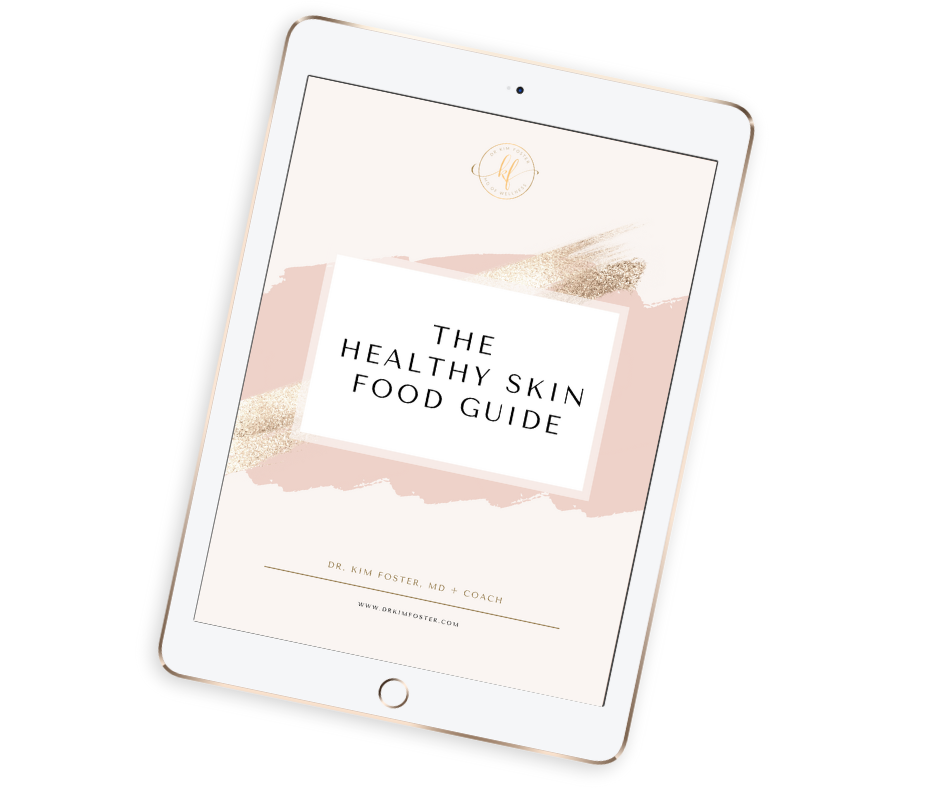You might have heard of the gut microbiome – the network of microbes in your gut that control your digestive health.
But did you know that you have a second microbiome located on your skin?
These microorganisms support various skin functions and communicate with the digestive system.
As the gut acts as the control tower, if there is a problem in the gut, there will likely be a problem in the skin.
So, if you’re prone to acne, eczema, psoriasis, or other skin issues, the reason could be poor gut health.
Don’t worry – it’s not as scary as it sounds.
In fact, by making the following 10 simple changes, you can improve your inner and outer health – no expensive skin creams required!
1. Eat a Diverse Diet
Eating the rainbow is one of the easiest ways to improve your gut (and skin) microbiome.
This means eating fruits and vegetables of all colors and a diverse range of carbohydrates, fats, and protein.
For example, your diet should consist of whole grains, legumes, and all types of lean protein rather than only chicken and white rice.
Moreover, rather than eating just one type of nut, opt for mixed nuts and seeds, as each type of food provides different yet equally vital nutrients for your gut.
If you want more examples of the foods you should eat to achieve glowing skin, download my free Healthy Skin Food Guide.
2. Increase Your Fiber Intake
Another nutrient you should prioritize is fiber. Fiber feeds the good bacteria in your gut, helping them thrive and flourish. It also keeps your digestive system running smoothly and regularly.
So, which foods are high sources of fiber?
Most natural plant-based foods are, including:
- Fruits
- Vegetables
- Whole grains
- Legumes
3. Take Probiotics
Probiotics are live bacteria and yeast, which act as superheroes of the gut microbiome world.
They introduce more good bacteria into your gut, promoting a state of microbiome equilibrium. Some research has also found that they can improve digestion-related health conditions like irritable bowel syndrome (IBS).
While you can find probiotics in supplements, I recommend consuming them from foods, too. You’ll find them in fermented foods like:
- Yogurt
- Kefir
- Sauerkraut
- Kimchi
- Kombucha
4. Take PREbiotics
While probiotics increase the amount of good bacteria in the gut, prebiotics support those beneficial microorganisms.
Prebiotics are not live bacteria but a type of fiber your gut bacteria feasts on. Imagine them as fertilizer, helping your good bacteria grow and multiply.
You can take prebiotic supplements or consume them from the following foods:
- Garlic
- Onions
- Leeks
- Asparagus
- Bananas
- Whole grains
5. Manage Your Stress Levels
Stress affects many aspects of our health, including our guts. This is because our gut microbiome interconnects with our nervous system. So, when our body goes into fight-or-flight mode, it can disrupt digestion and alter the microbiome balance.
So, one way to improve both your gut and skin health is to add mindfulness practices to your daily regime, such as:
- Meditation
- Deep breathing exercises
- Yoga
- Spending time in nature
6. Stay Hydrated
You may have heard that water works wonders on your skin health, but do you know why?
When you drink water, it combines with acids in the stomach to help break down proteins, which in turn aids in the digestive process. It helps to keep things moving smoothly, prevents constipation, and supports the composition of your gut microbiome.
So make sure you’re drinking plenty of water throughout the day!
7. Limit Sugar and Processed Foods
Sugary and highly processed foods are terrible for your gut health as they feed harmful bacteria. This messes up the balance of your microbiome and increases the risk of infection and illness.
So, where possible, choose whole, unprocessed foods and snacks with natural sugars, like fruits.
Moreover, when you want to sweeten your drinks or meals, use a small amount of honey instead of sugar.
8. Get Regular Exercise
Have you ever woken up the morning after a junk food dinner feeling heavy and sluggish, but after exercising, you felt ten times better?
This is because exercise stimulates digestion and promotes regular bowel movements, which, in turn, keeps your gut microbiome balanced.
So try incorporating a few cardio and strength training sessions into your week!
9. Get 7-9 Hours of Sleep Each Night
Sleep is crucial for all aspects of your health, including your gut and skin condition.
Skimping on sleep disrupts the balance of hormones in your body, which can lead to digestive issues.
Sleep deprivation also increases cortisol levels and triggers inflammation, which can manifest on the skin as nasty pimples.
10. Listen to Your Body
Finally, remember that all health recommendations are general guidelines, not absolute rules. Our bodies are unique, and so they respond to foods differently.
So pay attention to how different foods make you feel. If you notice a particular food upsets your stomach or causes digestive issues, consider eliminating it from your diet or limiting your intake.
Final Thoughts
To learn more about the link between skin and gut health and how to improve both, watch this week’s YouTube video.
Here’s where you can watch:
As always, I’d love to hear your thoughts on this. Are you struggling with skin issues? If so, which of these tips will you try first?
Let me know in the comments or find me on Instagram and send me a DM!
Download my FREE Healthy Skin Food Guide!


FREE CLASS!
Looking to take your wellness journey to the next level?
The 3 Secrets For Stepping Into A Meaningful New Career Without Wasting Time Or Money
- find out why health & wellness coaching is a skyrocketing industry that can provide the freedom and fulfillment you’ve been craving
- discover the 3 biggest myths about health & wellness coaching that will hold you back (and what the truth is instead)
- learn the secret sauce for getting amazing results for your clients (and building a profitable business as a wellness coach)
…and more!







